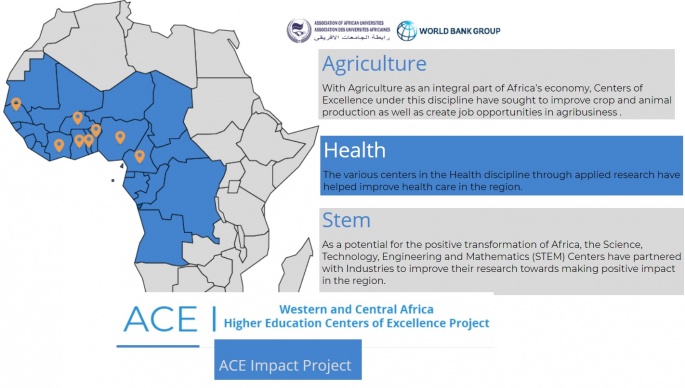Selection of 44 Centres of Excellence in West and Central AFRICA for the ACE Impact Project

 Building upon the successful implementation of the ACE 1 Project, the World Bank is now supporting the ACE Impact Project which is focused on scaling up postgraduate education and applied research that are fundamental to economic growth in the region...
Building upon the successful implementation of the ACE 1 Project, the World Bank is now supporting the ACE Impact Project which is focused on scaling up postgraduate education and applied research that are fundamental to economic growth in the region...
.jpg)
West and Central African countries, with support from the World Bank and the Association of African Universities, launched the regional Africa Higher Education Centres of Excellence (ACE) Project in 2014.
2 November 2018: The Association of African Universities (AAU), the Regional Facilitation Unit (RFU), of the Africa Centres of Excellence (ACE) Project, was pleased to announce the conditional selection of 44 centres of excellence in 12 participating countries in West and Central Africa (Benin, Burkina Faso, Cameroon, Cote d’Ivoire, Djibouti, Gambia, Ghana, Guinea, Niger, Nigeria, Senegal, and Togo) under the ACE for Development Impact (ACE Impact) Project! The following...
SEVEN PROPOSALS RELATED TO AGRICULTUREhave been conditionally selected as centres of excellence by the ACE Impact Ministerial Project Steering Committee at its meeting in Accra, Ghana: 1. CHANGEMENT CLIMATIQUE, BIODIVERSITE ET AGRICULTURE DURABLE (CEA-CCBAD) - Université Félix Houphouët-Boigny Cote d’Ivoire - climate change |
The concept of Regional centers of excellence in Africa offers an optimal and cost-effective way to build and sustain excellence in higher education in Africa because they foster regional specialization, concentrate limited top-level faculty, and generate knowledge spillovers.
THEMATIC AREAS THAT WERE FUNDED UNDER THE ACE1 PROJECT
1.) AGRICULTURE: Africa has experienced strong economic growth despite recent global downturns, and there has been a resurgence of traditional sectors such as agriculture and the extractive industries. Highly skilled agricultural scientists and researchers to drive economic growth and tackle food security challenges are required.
2.) HEALTH: African economies urgently need highly skilled medical and health workers who will provide the healthcare that is critical to fuel development.
3.) STEM: Science, Technology, Engineering and Mathematics: Higher Education, particularly in science and technology, holds the potential to be absolutely transformative for Africa, because it can equip young people with critical knowledge and skills that are in short supply on the continent… Read on more here
Since its launch in 2014, the African Centres of Excellence has proven productive in addressing challenges in the above mentioned thematic disciplines. Latest M&E report shows that about 8,100 studentshave been enrolled under the ACE Project; 25% are female students and 25% registered as Regional students. Moreover, there are 1600 PhDstudents, 6,500 Masters students and 16,000 short courses students. Read on more about major AVE achievements here.
SOURCE: African Center's of Excellence news
P.S. “Young researchers need help to identify appropriate journals and they need constructive feedback that can help them improve their research papers, instead of outright rejections," Professor Prozesky said in How can young scientists in Africa become research leaders? |
Related:
* From the AGRIS & AGORA Workshop in Malawi on enhancing accessibility and visibility of scientific publications in sub-Saharan Africa (November 2018)
* Any institution (and its members) from Research4Life eligible countries, areas, territories whose country is also listed in Summon Country-specific instances, can now have more accurate search options to find and retrieve full-text from all five Research4Life programmes! FURTHER DETAILS HERE
* Over one week spent in Gaborone, Botswana, Africa, with data professionals from across the globe, from 66 countries , RDA12, November 2018
* How to Read a Scientific Paper (Research4Life)
* Africa’s research funding system has created few winners: only 2% or so of scientists from just a handful of countries and fields report receiving million-dollar grants, while almost half say they don't receive any research funding. The big grants tend to be in fields favoured by foreign funders, such as agriculture and health sciences. That's because most research in Africa is still financed by agencies based in Europe, the United States and China. Africa’s science ‘millionaires’: survey spotlights top-funded researchers
* The African Open Science Platform: The Future of Open Science
* The Postharvest Management in Sub-Saharan Africa (PHM-SSA) Project aims to improve food security (increased food self-sufficiency and incomes) of smallholder farmers in SSA through reduction of postharvest losses of food crops (grains and pulses) by addressing major constraining factors of technology dissemination and adoption, knowledge and information sharing, rural advisory services (RAS) and policies related to PHM. Post harvest Access Agriculture videos and recorded Webinar: The adoption of Post Harvest Management in policies and development plans
* Report about the online e-consultation on Youth employment in agriculture as a solid solution to ending hunger and poverty in Africa (FAO eAgriculture)
* Call for Contributions: UNSCN Nutrition - Edition 44 - Open until 10 January 2019
* Global Nutrition Report 2018
.jpg)
Follow @AIMS_Community on Twitter… And, thanks again for your interest!

